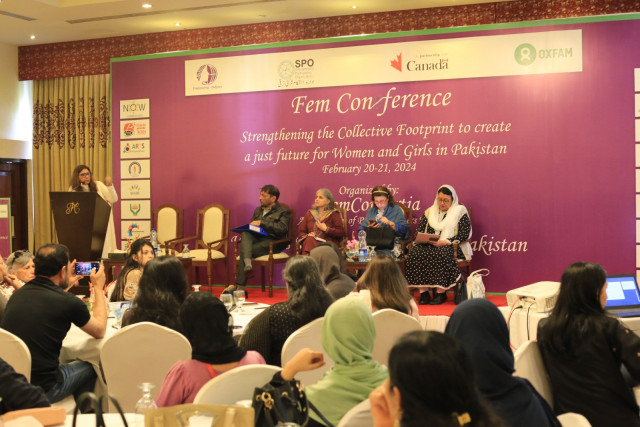‘Climate change impact unfairly burdens women’
Invaluable contributions of Pakistani women brought to forefront during two-day annual conference of Fem Consortia

Despite myriad challenges, women continue to play a pivotal role in supporting and nurturing their families, with a particular emphasis on their resilience in the face of climate change impacts.
The invaluable contributions of women in Pakistani society were brought to the forefront during the two-day annual conference of Fem Consortia, a coalition of 12 women’s rights organizations and five alliances across Pakistan.
Uzma Latif, presenting her groundbreaking research paper, shed light on the disproportionate effects of climate change on women, particularly in Sindh.
Focusing on Thatta and Mirpurkhas districts in Sindh, Latif underscored how climate change has magnified women’s caregiving roles within households, leading to detrimental effects on their mental health. She highlighted that the aftermath of events like the 2022 floods and the ongoing COVID-19 pandemic has led to food shortages, disproportionately affecting women, with Sindh recording the highest proportion of underweight women, both pregnant and non-pregnant.
Javeria Afzal, the climate change advisor of Helpage International, called upon political parties to prioritize discussions on climate change and its specific impacts on women, particularly those residing in rural areas.
Read 'Women bear disproportionate burden of climate change impact compared to men'
Meher Nosherwani from the Trust for Conservation of Coastal Resources emphasized that women, who are primarily responsible for managing food, fuel, and water within households, are more severely affected by climate change compared to men.
In a session focused on ‘Working Women,’ Rubina Jamil addressed the barriers faced by women in accessing economic opportunities, citing the lack of representation in decision-making processes and unequal wages. Jamil also highlighted the plight of women working in the agriculture sector, who often receive produce instead of fair wages.
Nuzhat Shirin highlighted shortcomings in existing legislation, particularly concerning home-based workers, urging for stronger legal protections. Despite these challenges, speakers acknowledged the resilience of women who continue to contribute positively to the country’s development.
Published in The Express Tribune, February 23rd, 2024.



















COMMENTS
Comments are moderated and generally will be posted if they are on-topic and not abusive.
For more information, please see our Comments FAQ